|
I. Introduction
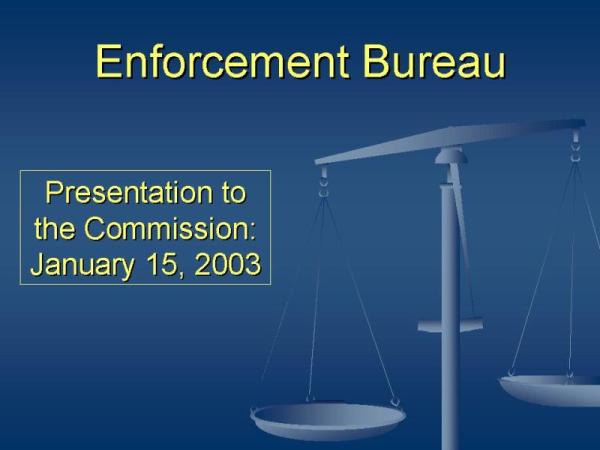
Good morning Mr. Chairman and Commissioners.
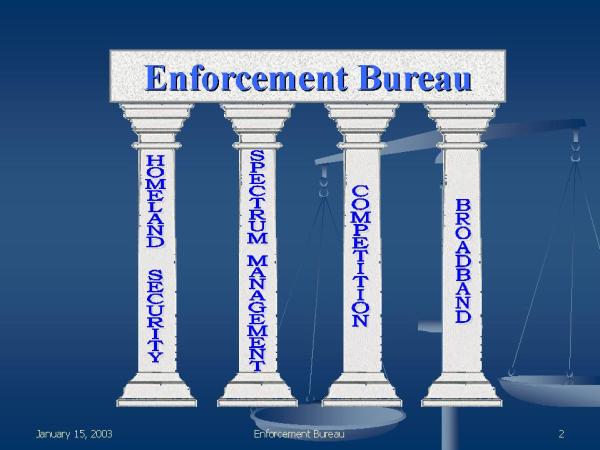
The Enforcement Bureau is pleased to have the opportunity to report
on our policy and management achievements during the last year and on
our goals for the coming year. Our key achievements have been in the
areas of homeland security, spectrum management, competition and
broadband.
I want to mention at the outset that we don't measure our success
solely by the amount of money assessed in our enforcement actions.
Nevertheless, financial consequences (and the related deterrence value)
are an important part of any enforcement program. In this regard, in
2002, we proposed or took about $31 million in enforcement action
involving public safety, competition and consumer protection, up from
about $8.5 million in 2001.
II. Policy Achievements
Homeland Security
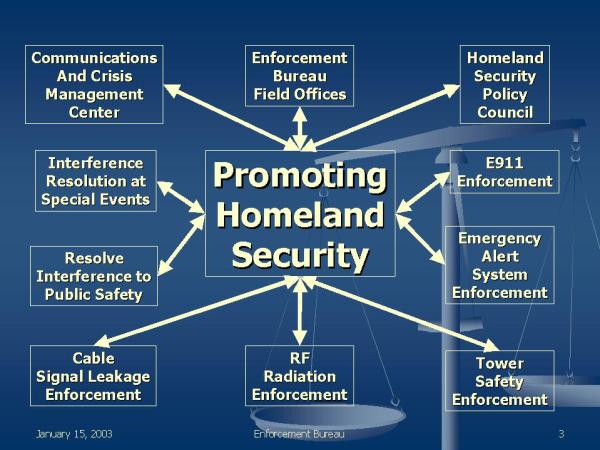
I will start with our homeland security achievements. Much of the
FCC's homeland security work is grounded in the Enforcement Bureau,
especially on the operational side. We run the FCC's Communications
and Crisis Management Center, which operates 24 hours a day/seven days
a week. Since 9/11, we have significantly upgraded the Center's
operational readiness. For example, we now house a data base that
includes emergency points of contact for over 80 of the companies that
we regulate and for all the agencies with which we work. In the event
of a crisis, we can immediately look to this data base to reach our
regulatees and sister agencies.
The Bureau's field offices have also played an important role in
the FCC's homeland security efforts by reestablishing ties with local
and regional FEMA offices. The FCC is now again a familiar presence in
the emergency preparedness community outside the beltway. In addition,
several of the Bureau's managers here at headquarters have had key
roles in the agency's Homeland Security Policy Council. In
particular, Linda Blair, Jim Dailey, Joe Casey and Arlan van Doorn have
been very active in this area. Among other things, they have helped
ensure that the agency's homeland security initiatives are properly
coordinated across Bureaus, maintained FCC relationships with more than
50 homeland security-related groups across the government and industry,
and worked closely with the Managing Director's Office on the FCC's
Continuity of Operations and Continuity of Government plans.
Finally, many of our public safety enforcement activities have
important homeland security implications. We have been actively
enforcing in such public safety areas as Enhanced 911, the Emergency
Alert System, tower safety, RF radiation and cable signal leakage. We
have also worked to ensure interference-free radio operation for
aviation, law enforcement and security personnel in many situations,
including the Salt Lake City Olympics and the International Monetary
Fund protests.
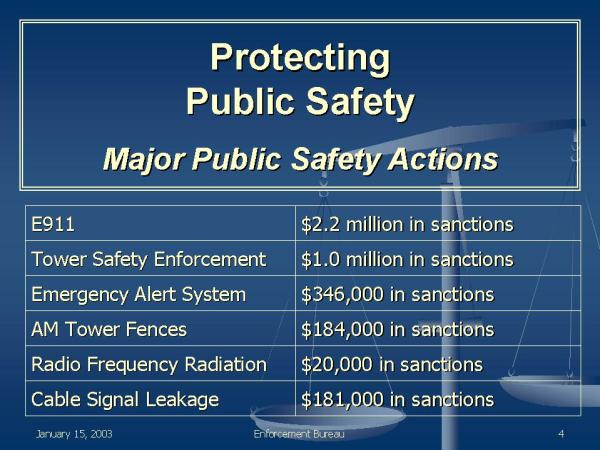
We believe our strong public safety enforcement will have an
important deterrent effect.
Spectrum Management
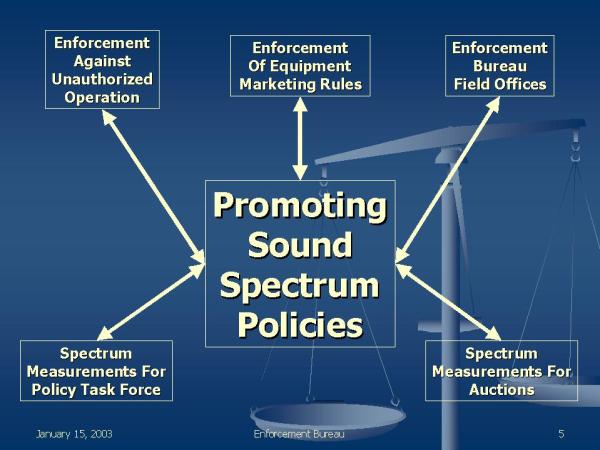
Turning to spectrum management, much of our public safety
enforcement work ensures spectrum integrity. This includes, for
example, enforcement against unauthorized operation and marketing of
unauthorized equipment. Equally as important, our field offices,
through special projects, have played an increasing role in the
Commission's spectrum policy initiatives. Last year, 10 of our field
offices conducted spectrum occupancy measurements in support of the
Commission's auction policies, and we will continue the project this
year in 16 cities. In support of the Spectrum Policy Task Force, we
also assessed actual spectrum use below 1 GHz in five major
metropolitan areas, identifying both spectrum that is not in use and
heavily used spectrum.
The funding we have received for new technical equipment and for
hiring new engineers played an important role in both our spectrum
management and homeland security achievements.
Competition/Broadband
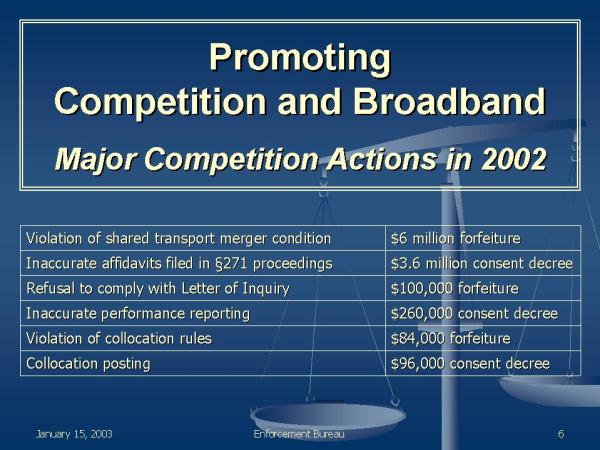
In the competition and broadband area, we took a number of actions
last year to enforce the market-opening requirements of the Act and the
Commission's rules. We focused significant resources on
staff-initiated investigations, and saw significant results. We
concluded several competition investigations, resulting in major
enforcement actions.
Of course, not every investigation uncovers a violation or leads to
a forfeiture or consent decree. That doesn't mean the investigation
wasn't successful. Sometimes, further action simply is not warranted.
The fact that we are out there conducting investigations, however,
keeps carriers on notice that if they break the rules, there will be
consequences.
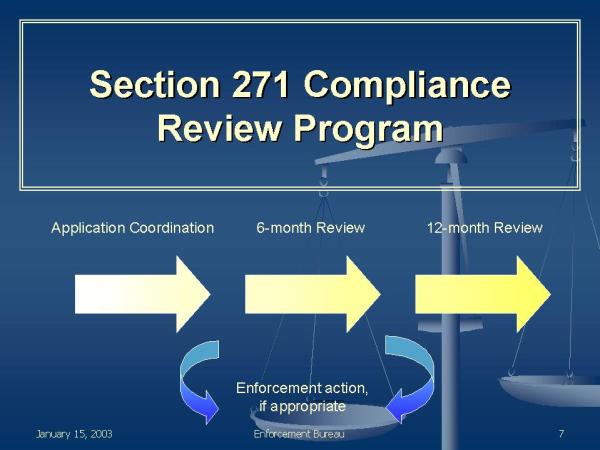
Several months ago, we initiated a structured section 271
compliance review program. With more Bell Operating Companies
receiving long distance authorization in more states, the focus is
shifting to ensuring continued compliance with section 271's
market-opening requirements. Teams of Enforcement Bureau attorneys,
auditors and other professionals have been assigned to each BOC region
to conduct regular compliance reviews six and 12 months after approval.
The compliance reviews will allow us to identify and act on problems
quickly, and provide the companies with strong incentives to maintain
compliance.
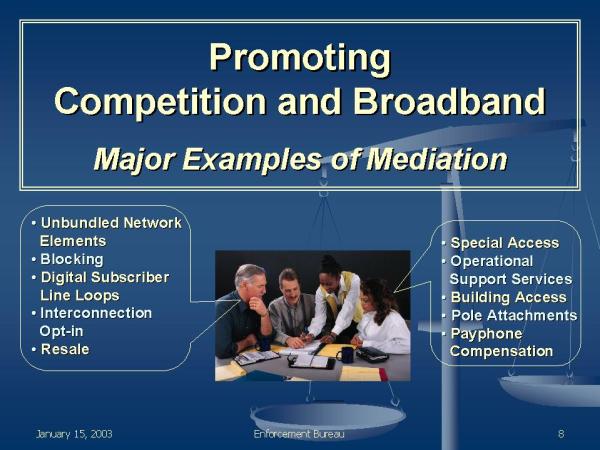
We also resolved dozens of significant competition issues through
mediation without the burden of litigation.
In the formal complaint area, we have timely resolved many
complaints involving local competition issues, sometimes ruling for the
complainants (for example, in the reciprocal compensation area) and
sometimes ruling for defendants. I'm also pleased to report our
success in preparing decisions that withstand judicial scrutiny. Of
the six court of appeals decisions involving formal complaints, the
Commission has won five in their entirety and won the sixth in
significant part.
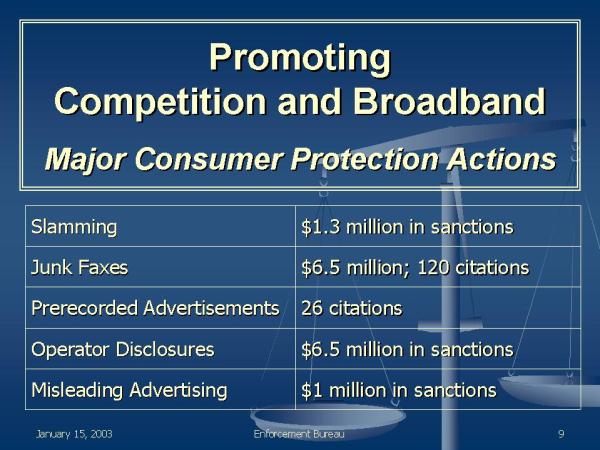
We have also been very active in initiating investigations and
taking enforcement action to protect consumers from anti-competitive
behavior in an increasingly competitive market. In addition to
continuing slamming enforcement, the Commission proposed or took strong
action against companies that sent unlawful junk faxes and operator
services companies that failed to give consumers proper identification
or information. We've also been more active in enforcing the
statutory ban on unsolicited pre-recorded telephone advertisements, and
have taken a number of broadcast indecency enforcement actions.
Finally in the consumer protection area, a few weeks ago, the
Commission entered into a strong consent decree in the misleading
advertising area.
III. Management Achievements/Modernizing the FCC
Training
On the management front, some of our biggest success stories
involve training. With help from the Managing Director's Office, we
created and implemented a knowledge sharing program that involves field
personnel spending time in Washington and vice versa to exchange
expertise and experience. This program has worked well and we hope to
continue it.
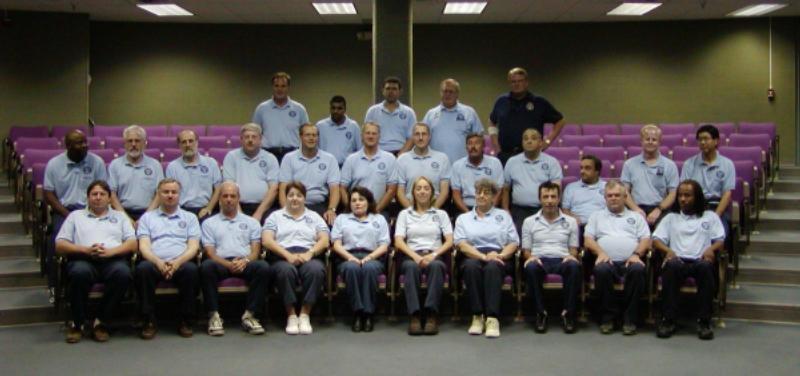
We also completed a two-year project to have our field agents
attend safety training at the Federal Law Enforcement Training Center
in New Mexico, where courses ranged from defensive driving skills to
reading body language well enough to determine when to terminate an
interview for safety reasons. Our employees also took advantage of the
Commission's increased support for training opportunities through a
variety of other courses. For example, our auditors took a course on
Analysis Techniques, several of our attorneys took a course on
Effective Legal Negotiation and Settlement, and two of our engineers
have been accepted into the Commission's Graduate Degree Program.
Overall, more than 150 Enforcement Bureau employees took over 80
different specialized training courses.
Work Flow and Backlog
Regarding work flow, we had a very productive year. We issued
nearly 600 orders. Moreover, we met or exceeded our speed of disposal
goals in every category. For instance, although our Market Disputes
Resolution Division has lost a number of attorneys through attrition,
we are still resolving most complaints within about a year. In
addition, Market Disputes mediated over 60 disputes last year, and
resolved almost two thirds of them successfully.
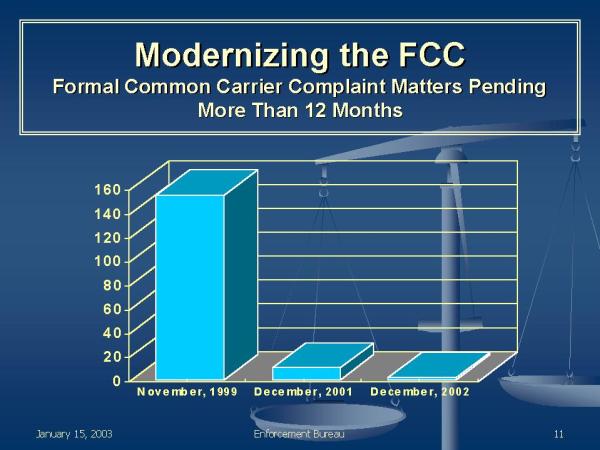
I'm also pleased to report that the Enforcement Bureau currently
has no significant backlog. We have only two formal common carrier
complaints that have been pending for more than a year. This is down
from 10 last year and over 150 when the Bureau began three years ago.
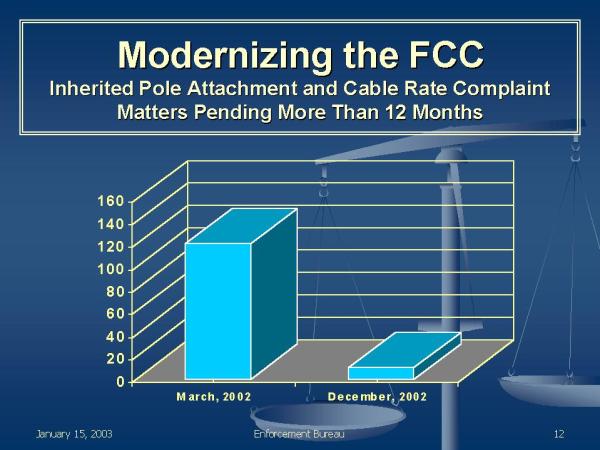
Similarly, while we inherited approximately 120 cable rate and
pole attachment cases more than a year old as part of the March 2002
reorganization, we now have only nine such cases.
IV. Goals for 2003
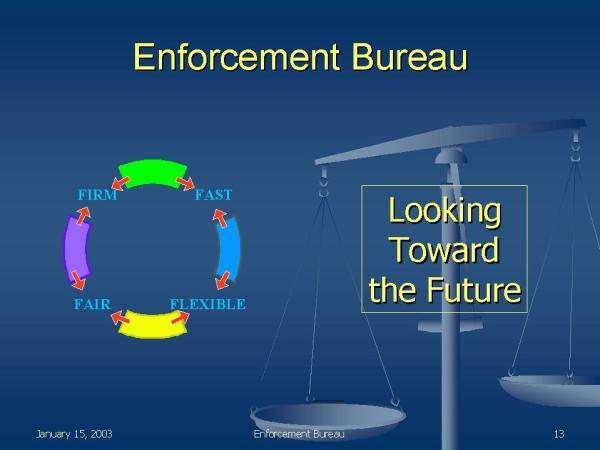
Looking ahead to 2003, we aim to stay focused on sustaining the
FCC's role as a credible enforcement agency.
At headquarters, we expect to be even more active on section 271
and E-911 enforcement. In the field, we intend to further develop and
obtain the expertise and equipment needed to deal with interference in
the digital age.
I am confident that EB's talented and hardworking staff will
continue to do great work on behalf of the American public. Thank you.
|

